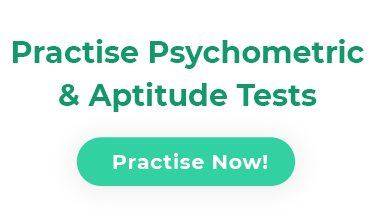IBM Assessment Test, Recruitment Process & Interviews Online Preparation – 2025

What Is IBM?
International Business Machines, or IBM, is a veteran in the information technology industry with over 100 years of experience. Headquartered in New York, IBM employs over 345,000 people across 170 countries. IBM upholds their reputation by hiring top-notch professionals that meet the following criteria:
- Dedication to the Client
- Innovative
- Trustworthy
What Is IBM’s Hiring Process?
IBM’s hiring process differs slightly based on the candidate’s level of experience. Below is an outline of every possible recruitment stage someone could encounter. However, most applicants will go through four steps until a formal job offer is made. If you are an experienced professional, you can expect to see the following steps in the IBM hiring process:
- Application & CV
- Aptitude Test
- Telephone Interview
- Assessment Centre
- Final Interview
Application
Submitting an application for IBM serves as the initial screening. Looking through your experience, education, and qualifications, IBM will decide if the applicant will move on to the next stage of the hiring process. They look for diversity on applications such as community service, studying abroad, or unique extracurriculars.
IBM’s Online Assessment
The aptitude tests offer IBM insight into the intelligence and technical abilities of a candidate. IBM takes the scores of these assessments very seriously and will bar candidates from further consideration if they don’t meet a certain benchmark. Some job positions use different assessments, but they all have at least one in common, the IPAT. The following assessments are also common in the hiring process:
- Work Style Inventory
The work style inventory examines behaviour and personality in the workplace. The test will inquire about the organisation, prioritisation, and communication skills among other things. Candidates must rate how much they relate to a statement by selecting an answer choice of “Yes” or “No”. IBM administers this assessment to get an idea of how well a candidate might fit in with the atmosphere.
- Cognitive Ability Test
The cognitive ability test is a twelve-minute assessment that appraises general intelligence. There are three different parts: math, logic, and verbal comprehension. The cognitive ability assessment includes fifty multiple-choice questions.
- IPAT
The IPAT was created by IBM to assess their candidates and ensure that they are up to the company’s standards. It’s considered one of the hardest assessment tests with two eighteen question sections and only two-minutes and fifteen-seconds to answer each multiple-choice question. The sections are mathematical reasoning and numerical series, and they get progressively more difficult.
- Diagrammatic Reasoning
The diagrammatic reasoning assessment is a non-verbal test that analyses the ability to identify patterns and draw conclusions from ambiguous, novel themes. The assessment provides matrices of shapes in various patterns that are portrayed by changes in position, colour, or shape. The candidate must choose from five different answer choices to accurately complete the sequence.
- Excel
The Excel assessment is administered to candidates for entry-level positions to make sure they can use the tools necessary to get the job done. The test comes in three different levels, basic, intermediate, and hard.
IBM’s Assessment Centre
The assessment centre will be one to two days depending on the level of experience the candidate possesses. Most internships require two days at the assessment centre and more in-depth exercises.
Candidates will participate in numerous activities including a group exercise, an interview, psychometric tests, and a case study. They are evaluated on the exercises themselves as well as their leadership and teamwork abilities. All of the participants will speak to the evaluators, usually an HR rep and a senior member of their field, at the end of the day to go over their performance.
Final Interview
The final interview is a combination of technical and competency-based questions. Some positions require candidates to interview in front of a panel, and others occur one on one with the head of a particular department. Lots of the questions revolve around hypothetical scenarios and problems which the candidate must solve aloud to the interviewers. The average interview lasts anywhere from thirty to sixty minutes.
How to Prepare for IBM’s Online Assessments?
IBM’s online assessments are meant to be complex and difficult because they serve the purpose of separating and selecting high-quality candidates. For this very reason, it is crucial that enough time is spent preparing for these assessments.
A common study method is the use of practice tests. You can choose between taking full-length or short versions of the assessment. They mock the time limits, and some will give you slightly more time to help you get used to the constraints. Practice tests will also accustom you to the content. For example, the puzzles in the diagrammatic reasoning test are designed to be unfamiliar, but candidates can take a practice test and get a head start working through the sequences and patterns. This way, the actual test doesn’t seem so foreign when you encounter it.
If you are more worried about the material and information than you are the time, then sample questions may be the way to go. Some are taken right from the assessment, but most resemble the general themes of the questions on the test. Preparing with these sample questions allows you to focus on the archetypes of the questions and the thought process that leads to a correct answer.
It may help to group the assessments based on how difficult you think they may be. This will allow you to put your efforts into preparing for the more strenuous tests so that you have solid scores across the board.
Conclusion
IBM wants to see well-prepared candidates during the interview process. Their effort during these stages is a precursor to the amount of effort they are willing to put into the job. So, if you are going to take anything away, remember to practice and prepare and practice again. Best of luck!

